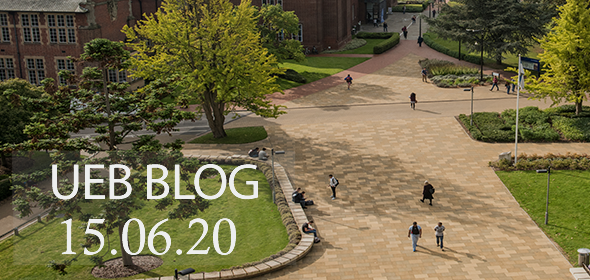Author: Shaun Williams, Executive Director Engagement and Advancement
A number of issues were discussed in today’s UEB meeting:
- There was a detailed discussion about business planning for 2020/21. The unprecedented uncertainty that all universities are currently facing as a result of the COVID-19 pandemic means that many of the original business planning assumptions around student recruitment, research income and expenditure have now been overtaken by events. As a result, we have drawn up different scenarios looking at the potential financial impact varying degrees of reduction in student recruitment and research income will have on key areas of our income and expenditure, and the mitigation options we will need to consider implementing during the next financial year as a consequence.

We have been clear that we are looking forward to welcoming new and returning students to our campuses in Southampton and Winchester for the start of term on 28 September. We are busy preparing for the re-opening of our laboratories, research facilities and other buildings, and ensuring we can provide a safe and fulfilling campus experience for our students and staff, recognising that there will need to be a blend of face-to-face and online learning during the year ahead. However, like all universities we need to assume that as a result of the pandemic there is likely to be some reduction in the planned number of UK students joining us in the autumn, and potentially a more substantial reduction in the number of international students. What is less clear at this stage is whether this will be a one-year blip, or whether it might take one or two years before we return to a more stable ‘new normal’ position.
We will have greater clarity after Confirmation and Clearing in August, once we have seen enrolments in September, and in January when we have seen enrolments for some of the PGT courses which next year will start in January. We will test our scenarios and assumptions at each of those check-points, but it is inevitable that some significant reductions in our expenditure will be required during the 2020/21 financial year, whilst taking care not to damage our prospects for longer-term recovery. We expect to provide more details of what this will entail by the end of July, and present a measured introduction of the mitigating actions.
- In the light of the challenging year ahead, it was agreed that sabbaticals should be postponed for 2020/21. This recognises the need to maximise the staff support we will need to give to the student experience next year, and that staff support and availability could be limited at times by continued remote-working and possible higher than usual levels of staff illness and absence through an autumn and winter which could potentially see further waves of the pandemic. It will also allow teaching activities to be more evenly distributed. UEB recognised some staff will be disappointed by this decision, but it was the right decision for the institution.
- UEB also approved a proposal to restart and complete the outstanding elements of the 2019/20 Education, Research and Enterprise Pathway (ERE) Level 7 promotion round, which was paused in March as the pandemic worsened and lockdown began. UEB felt it was important to recognise and value the contribution made by colleagues and close an existing process which had started prior to the disruption of the COVID-19 pandemic. However, in the light of the financial challenges we will face during the next financial year, the 2020/21 promotion and re-banding process will not take place.
- Finally, UEB considered potential capital projects which could be suitable for new economy-priming funding by Local Enterprise Partnerships (LEPs), received an update on developments around pay and conditions at national level, and approved the Health, Safety & Risk monthly report. A rather short report, as there was not a single incident reported during May, unsurprisingly with many buildings shut and campus access limited to essential users only during the COVID-19 lockdown.